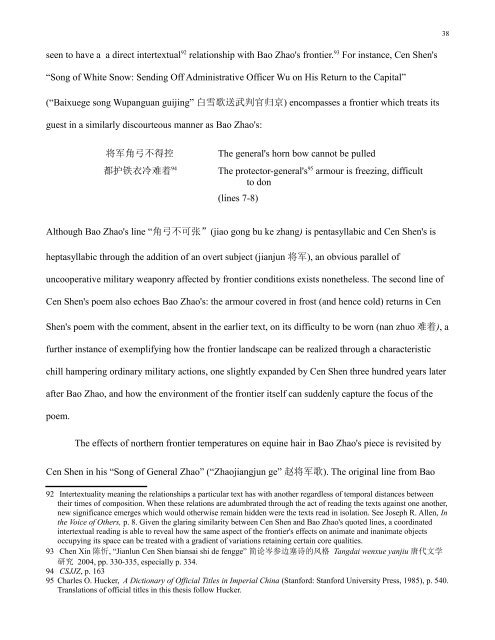View/Open - University of Victoria
View/Open - University of Victoria
View/Open - University of Victoria
Create successful ePaper yourself
Turn your PDF publications into a flip-book with our unique Google optimized e-Paper software.
38<br />
seen to have a a direct intertextual 92 relationship with Bao Zhao's frontier. 93 For instance, Cen Shen's<br />
“Song <strong>of</strong> White Snow: Sending Off Administrative Officer Wu on His Return to the Capital”<br />
(“Baixuege song Wupanguan guijing” 白 雪 歌 送 武 判 官 归 京 ) encompasses a frontier which treats its<br />
guest in a similarly discourteous manner as Bao Zhao's:<br />
将 军 角 弓 不 得 控<br />
都 护 铁 衣 冷 难 着<br />
94<br />
The general's horn bow cannot be pulled<br />
The protector-general's 95 armour is freezing, difficult<br />
to don<br />
(lines 7-8)<br />
Although Bao Zhao's line “ 角 弓 不 可 张 ”(jiao gong bu ke zhang) is pentasyllabic and Cen Shen's is<br />
heptasyllabic through the addition <strong>of</strong> an overt subject (jianjun 将 军 ), an obvious parallel <strong>of</strong><br />
uncooperative military weaponry affected by frontier conditions exists nonetheless. The second line <strong>of</strong><br />
Cen Shen's poem also echoes Bao Zhao's: the armour covered in frost (and hence cold) returns in Cen<br />
Shen's poem with the comment, absent in the earlier text, on its difficulty to be worn (nan zhuo 难 着 ), a<br />
further instance <strong>of</strong> exemplifying how the frontier landscape can be realized through a characteristic<br />
chill hampering ordinary military actions, one slightly expanded by Cen Shen three hundred years later<br />
after Bao Zhao, and how the environment <strong>of</strong> the frontier itself can suddenly capture the focus <strong>of</strong> the<br />
poem.<br />
The effects <strong>of</strong> northern frontier temperatures on equine hair in Bao Zhao's piece is revisited by<br />
Cen Shen in his “Song <strong>of</strong> General Zhao” (“Zhaojiangjun ge” 赵 将 军 歌 ). The original line from Bao<br />
92 Intertextuality meaning the relationships a particular text has with another regardless <strong>of</strong> temporal distances between<br />
their times <strong>of</strong> composition. When these relations are adumbrated through the act <strong>of</strong> reading the texts against one another,<br />
new significance emerges which would otherwise remain hidden were the texts read in isolation. See Joseph R. Allen, In<br />
the Voice <strong>of</strong> Others, p. 8. Given the glaring similarity between Cen Shen and Bao Zhao's quoted lines, a coordinated<br />
intertextual reading is able to reveal how the same aspect <strong>of</strong> the frontier's effects on animate and inanimate objects<br />
occupying its space can be treated with a gradient <strong>of</strong> variations retaining certain core qualities.<br />
93 Chen Xin 陈 忻 , “Jianlun Cen Shen biansai shi de fengge” 简 论 岑 参 边 塞 诗 的 风 格 Tangdai wenxue yanjiu 唐 代 文 学<br />
研 究 2004, pp. 330-335, especially p. 334.<br />
94 CSJJZ, p. 163<br />
95 Charles O. Hucker, A Dictionary <strong>of</strong> Official Titles in Imperial China (Stanford: Stanford <strong>University</strong> Press, 1985), p. 540.<br />
Translations <strong>of</strong> <strong>of</strong>ficial titles in this thesis follow Hucker.
















